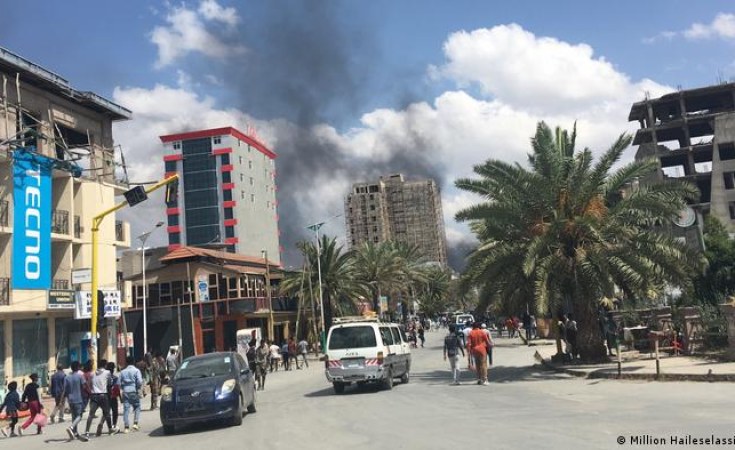Geneva — Understanding why the UN fails in civil wars is crucial to improving how it operates.
It must have been sometime earlier this year, in the middle of a seven-month-long editing process, that I was told the word "failure" appeared too many times in the draft evaluation report on the aid response in northern Ethiopia. More than an editing issue, the report was expected to present examples of good humanitarian practice.
There is little good news to report, however. I led a team tasked with evaluating the inter-agency humanitarian response to the crisis in the northern Ethiopian regions of Tigray, Afar, and Amhara between November 2020 and April 2023. Our findings, published on 3 June, describe the UN-led collective aid effort as a systemic failure.
We had unparalleled access to understand what went wrong. In hundreds of interviews with humanitarians, government officials, and war-affected communities, we detailed the government's obstruction of aid, a lack of unity among UN agencies, and the international community's failure to respond to large-scale sexual violence and the harassment of humanitarian staff.
Granted, the Ethiopian federal government was highly effective at blocking aid. In the two-year war, civilians were starved to death, their basic healthcare structures destroyed, telecommunications cut, and the banking system prevented from operating. These circumstances may partly explain a less-than-optimal humanitarian response. Yet, they should also be a reason to try harder.
Recognising that inaction risked further tarnishing the UN's reputation, António Guterres, the UN Secretary-General, called on the chiefs of UN and other humanitarian agencies to mobilise, seven months into the war. But the so-called system-wide scale-up that followed was mostly unsuccessful, our evaluation found.
UN agencies were largely divided when it came to engagement with the authorities. There are 28 UN organisations and offices in Addis Ababa, but these representatives failed to agree to protect the civilian population in the three northern regions. Leaked audio recordings of UN meetings illustrate that some of the agency directors in Ethiopia even denied credible reports of large-scale sexual violence in the conflict.
In the following 24 months, several UN agency chiefs, the EU High Representative for Foreign Affairs, the US Secretary of State, and other senior officials met with Prime Minister Abiy Ahmed. Reportedly, the crisis was frequently discussed in those meetings, but without any tangible improvements on the ground. Meanwhile, humanitarian staff negotiating access to Tigray reported having little information on the outcomes of such meetings in the capital. While staff active in Tigray were going the extra mile to step up the delivery of services, in reality all they could do was keep count of the few convoys allowed into the region.
Most telling is the UN's silence in relation to the many cases of harassment, arbitrary arrest and detention, and torture of humanitarian staff - many of whom, yet by no means all, were of Tigrayan ethnic origin - by Ethiopian security forces during the war. For Gaza, Guterres drew a line in December 2023 where he invoked Article 99 of the UN Charter, indicating that the conditions there were such that meaningful humanitarian operations could not be conducted. A similar step should have been taken during the conflict in northern Ethiopia.
Several failures could have easily been prevented. The dismal action in response to large-scale sexual violence was primarily the result of the lack of leadership in the response, and the absence of clear reporting lines and accountabilities. The estimated numbers of people in need were largely unreliable due to the interference from authorities - a finding that appeared in an earlier evaluation report, but which was not acted upon. And with the early indications that the humanitarian coordination in Addis Ababa was in disarray, UN directors should have been replaced in the response.
Ironically, several waves of humanitarian reform initiatives since the mid 2000s sought to address failures like these. Yet the implementation of these reforms still falls short. Last year, the primary focus of enhancing Ethiopia's humanitarian response was the distribution of food aid following reports of a substantial diversion of supplies. In reality, food aid has been instrumentalised in Ethiopia for years, if not decades. The issue that captured international donors' attention was a convenient distraction from holding perpetrators of war crimes and crimes against humanity accountable.
The evaluation report is one of the few public documents providing evidence of the gravity of the failure of the international response in northern Ethiopia. But what of its impact? It's standard practice that the UN-led humanitarian team in a country subject to such a review develops a management response. In this case, most of the recommendations are aimed at addressing the functioning of the global humanitarian coordination mechanism, known by its acronym, IASC. The IASC, however, is preoccupied by other crises and is undergoing a transition in leadership. The chances of this evaluation report being buried are high.
The failed response in northern Ethiopia has huge implications for the reputation of the UN as an effective humanitarian actor. Parallels with the current crisis in Sudan are striking: UN agencies lack a clear strategy, and are ineffective in negotiating unimpeded access. Growing the public understanding of why the UN fails in civil wars is instrumental to fostering much-needed reforms on how it operates.
The value of this evaluation is that it lays bare the international humanitarian system's mistakes, and suggests ways to address them. Endless global discussions on strengthening capacity, localising decision-making, and connecting humanitarian and development assistance have done little to avoid repeated failures. Accountability for this is long overdue.
Ed Schenkenberg van Mierop, Executive Director of HERE, a Geneva-based humanitarian think-tank, and team leader of the inter-agency humanitarian evaluation of the response to the crisis in northern Ethiopia


